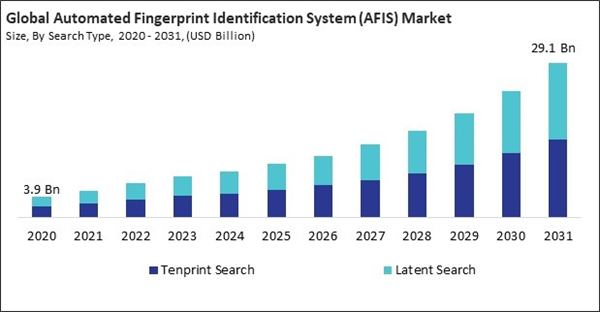The need for accurate patient identification and secure access to medical records fuels the healthcare industry’s adoption of AFIS technology. AFIS helps healthcare providers ensure that patient information is correctly matched to the right individual, reducing the risk of medical errors and enhancing patient safety. Additionally, using AFIS in healthcare facilities enhances the security of controlled substances and restricted areas, ensuring that only authorized personnel have access. Implementing AFIS technology in healthcare is instrumental in maintaining patient data integrity and improving overall healthcare delivery, contributing to the segment’s significant revenue share. Thus, the healthcare segment procured 11% revenue share in the automated fingerprint identification system (AFIS) market in 2023.
AFIS offers reliable access control, ensuring only authorized personnel can enter sensitive areas or access critical information. Adopting biometric authentication solutions is becoming a standard practice in sectors such as finance, healthcare, and government, where data sensitivity is paramount. This necessity for secure access drives the growth of the automated fingerprint identification system (AFIS) market. Additionally, AFIS technology allows authorities to perform rapid fingerprint comparisons against extensive databases, streamlining the process of identifying migrants. This capability is essential in enhancing national security while ensuring the fair and efficient processing of individuals crossing borders. Thus, the rising prevalence of migration worldwide serves as a significant driver for the growth of the automated fingerprint identification system (AFIS) market.
However, AFIS vendors or upgrade their systems may encounter challenges migrating existing biometric data. If the new system does not adhere to the same standards as the previous one, data compatibility issues may arise, leading to potential data loss or corruption. This situation creates apprehension about long-term investments in AFIS solutions. Thus, the difficulty in establishing a universal standard for biometric data is driving the market's growth.
The leading players in the market are competing with diverse innovative offerings to remain competitive in the market. The above illustration shows the percentage of revenue shared by some of the leading companies in the market. The leading players of the market are adopting various strategies in order to cater demand coming from the different industries. The key developmental strategies in the market are Acquisitions, and Partnerships & Collaborations.
Driving and Restraining Factors
Drivers- Rising need for enhanced security measures in a digital age
- Increasing adoption of biometric technologies across various sectors
- Increasing prevalence of migration worldwide
- High implementation and maintenance costs associated with AFIS solutions
- Difficulty in establishing a universal standard for biometric data
- Government initiatives and regulations promoting biometric authentication
- Expansion of smart city initiatives incorporating biometric solutions
- Potential for misuse and ethical concerns regarding biometric surveillance
- Need for continuous updates and system upgrades
End Use Outlook
By end use, the market is divided into banking & finance, consumer electronics, defense & security, government, healthcare, transport & logistics, and others. The government segment witnessed 33% revenue share growth rate in the market in 2023. Governments worldwide increasingly adopt AFIS technology for various applications, including law enforcement, border control, and civil identification programs. AFIS enhances public safety and security by providing reliable and efficient identification methods.Component Outlook
On the basis of component, the market is segmented into hardware, software, and service. In 2023, the software segment attained 32% revenue share in the market. Software components are responsible for analyzing and matching fingerprint data, ensuring accurate identification and verification. Several factors contribute to the significant revenue share of the software segment.Search Type Outlook
Based on search type, the market is segmented into tenprint search and latent search. In 2023, the tenprint search segment procured 53% revenue share in the market. Tenprint searches involve comparing an individual’s ten fingerprints against a database to confirm identity. This method is extensively used for background checks, issuing identity cards, and verifying individuals in high-security environments.Regional Outlook
Region-wise, the market is analyzed across North America, Europe, Asia Pacific, and LAMEA. In 2023, the Asia Pacific region generated 31% revenue share in the market. The increasing emphasis on security and identity verification in countries such as China, India, and Japan have significantly contributed to this growth.List of Key Companies Profiled
- CardLogix Corporation
- Dermalog Identification Systems Gmbh
- M2SYS Technology, Inc.
- Fujitsu Limited
- HID Global Corporation (Assa Abloy AB)
- BIO-key International, Inc.
- NEC Corporation
- Thales Group S.A.
- Synaptics Incorporated
- Aware, Inc.
Market Report Segmentation
By Search Type- Tenprint Search
- Latent Search
- Hardware
- Software
- Service
- Government
- Defense & Security
- Banking & Finance
- Healthcare
- Transport & Logistics
- Consumer Electronics
- Other End Use
- North America
- US
- Canada
- Mexico
- Rest of North America
- Europe
- Germany
- UK
- France
- Russia
- Spain
- Italy
- Rest of Europe
- Asia Pacific
- China
- Japan
- India
- South Korea
- Australia
- Malaysia
- Rest of Asia Pacific
- LAMEA
- Brazil
- Argentina
- UAE
- Saudi Arabia
- South Africa
- Nigeria
- Rest of LAMEA
Table of Contents
Companies Mentioned
Some of the key companies profiled in this Automated Fingerprint Identification System (AFIS) Market include:- CardLogix Corporation
- Dermalog Identification Systems Gmbh
- M2SYS Technology, Inc.
- Fujitsu Limited
- HID Global Corporation (Assa Abloy AB)
- BIO-key International, Inc.
- NEC Corporation
- Thales Group S.A.
- Synaptics Incorporated
- Aware, Inc.











